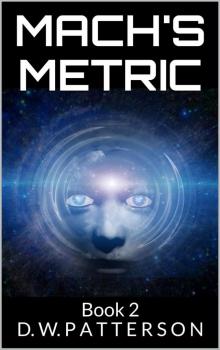- Home
- D. W. Patterson
Cycle of Stars Page 8
Cycle of Stars Read online
Page 8
The semester came to an end and the ship was ready to go.
Jump-Ship One (JS1) headed out to the quarantine jump limit. Because of its slower acceleration capability, the trip took almost a month.
Since the Star Bound had encountered the phenomena of interest almost at the distance of the Libertas System which was two-hundred light-years from Earth or two-hundred fifteen light-years from the Kaffa System, the captain, Rain Reynolds and Dag decided to take four jumps of forty light-years to where they thought the mouth of the wormhole cylinder might exist now. It would take twenty-eight days at least to make those jumps.
Once at the quarantine limit the navigator calculated a jump so that the ship would be within a few AU of a star along their heading. There the ship would circle for a week or so to recharge its isotopics for the next jump.
Between the jumps, Dag and Ally kept busy running tests on their equipment and developing procedures to detect the giant wormhole. Detection would use the Casimir devices. Once found, mapping the spacetime around the wormhole would fall to the gravity interferometer, a constellation of tiny spacecraft that in triangular formation measured the distance between and therefore the resultant spacetime warp. A change in the distance between spacecraft would indicate a change in warp. Several of these gravity interferometers would map spacetime close to and far from the phenomena.
The last jump complete the JS1 stopped long enough for Dag and Ally to get readings with the equipment. Once finished they spoke with Captain Reynolds.
“It looks as if we are still a few AU from the phenomena Captain,” said Dag. “But we are already experiencing some large gravity waves. We will have to be careful not to get caught in the same time spiral that the Star Bound got caught in.”
“Okay Dr. Mach. What do you suggest?”
“Well, set course for the phenomena, but at a reduced speed and I will keep you apprised of the instrument readings.”
After a brief acceleration, the JS1 sailed toward the spacetime cylinder at a constant velocity. The crew wheel was started up to provide some gravity for the crew. Dag and Ally kept a close watch on their instrumentation.
The gravity interferometer units were essentially flying ahead of the JS1 relaying their readings every few minutes back to the ship. The Casimir devices were detecting a greater and greater amount of broken entanglements indicating that even at several AU the huge wormhole was having an effect on spacetime.
Dag had set an alarm on his Emmie that would signal when the gravity distortions from the wormhole were too great for the safety of the ship. At that point he would advise the Captain to vector perpendicular to the wormhole and begin spiraling around the object.
He was in his room when his Emmie alarmed. They were entering the area of strong gravitation that concerned him. Dag immediately called the Captain and had him implement a change in course to spiral at this distance. Once finished he got a call from Ally.
“Dag my alarm has gone off.”
“I know Miss, mine too. I've already informed the Captain to change course.”
“Good I will see you in the instrumentation lab.”
“You mean we are circling the wormhole instead of spiraling and even at this distance it is affecting us?” asked Ally after meeting Dag in instrumentation.
“I think so Ally but the circle is not completely closing on itself, yet. Of course, it's hard to tell for sure since we are all affected by the phenomena . . . we are all affected by the phenomena.”
“How?”
“Mini-loops of time. We probably wouldn't even notice . . . even notice.”
“So we could be repeating . . . could be repeating ourselves without knowing it?”
“Yeah.”
“Are we in any danger?”
“No I don't think so . . . don't think so as long as it stays at this level.”
“Dag?” A call came over his Emmie.
“This is the Captain . . . the Captain.”
“Would you come to control and bring Ally.”
“Yes sir.”
“It must be . . . must be something important for him to use our first names,” said Ally.
Ally and Dag arrived in the ship's control room.
“Dag, Ally would you please take a look at these readings.”
Ally and Dag moved to look at the navigator's console. There was a blip that seemed to come and go.
“How far away . . . away navigator?” asked Dag.
“Sir, several thousand klicks.”
“Any idea what it could be?”
“Well it's very difficult to detect . . . to detect but the instrumentation thinks its another ship.”
“Dr. Mach,” said the Captain. “There couldn't possibly be another ship in this area could there?”
“I don't think so sir. I think it is a reflection. The Star Bound saw the same thing . . . the same thing. But their reflection was a lot more real.”
“Yeah they talked to it,” said Ally.
“But we tried to call and got no response,” said Captain Reynolds.
“It's probably too weak and far away,” said Dag.
“Understood Dr. Mach. It's just a little spooky. What do we do now?”
“Sir I want you to alter the course slightly. We will head back in the direction of Kaffa in a spiral around the phenomena. I would like to find . . . to find the mouth of this wormhole.”
It was a few hours later, Ally and Dag were working with their instrumentation.
“So now that we are not circling the wormhole but spiraling around it there is no longer the chance of closed time-like loops, that's right?”
“Yes Miss, I think the course change has eliminated any time-loops. But there may be other effects.”
Just then the Captain called.
“Dr. Mach something is happening.”
“Yes Captain?”
“That reflection, it's made contact with us. I just finished talking to myself.”
“I'll be right there Captain. Miss would you stay and monitor the instruments.”
Ally nodded.
Entering control Dag saw the distant ship magnified on the wallscreen. It did look exactly like the JS1.
“See Dr. Mach,” said the Captain.
“I see Sir.”
Dag got on his Emmie and called Ally.
“Miss,” he said. “We've got a problem. That ship reflection has solidified. It shouldn't have. Something's wrong with our readings.”
“How could that be Dag?”
“I don't know but we must be closer to the wormhole than we thought. That might explain why we came close to being locked in a time-loop. We're going to have to think this through.”
“Captain, would you call a meeting please? We need to discuss this new phenomenon.”
There in the wardroom Dag was presenting the situation to the others.
“According to our instrumentation, nothing has changed since I suggested to the Captain that we start making our way toward the end of the wormhole. The Casimir device and the gravity interferometer both show the same readings.”
“So what's the problem Dr. Mach,” asked the Chief Engineer.
“The problem sir is that with these readings that ship out there should still be a very ephemeral object. Just as we first saw it.”
“But it isn't,” said the Captain. “I talked to it. There was no hint that it didn't exist.”
“I know Captain and that's worrisome. It appears that in this spacetime something is interfering with my instrumentation. Not only that but something is interfering with our navigation systems so that we are not spiraling around the wormhole at the distance we thought.”
“What you are saying Dr. Mach is that we can't trust our instrumentation,” said the Captain. “We're flying blind?”
After the meeting broke up Dag said goodnight and checked the instrumentation one more time before retiring to his quarters. He had to think through these new findings.
That ship out there is clo
se and as solid as we are. We are obviously nearer to the wormhole than my equipment indicates. But how can that be?
Something has to be suppressing the breakdown of entanglement that I expected at this distance. Therefore my calibrations are off, resulting in the distance error. But if we are so close to the wormhole shouldn't the gravity interferometer show it?
No, because it is being affected in the same way as the ship. Without an accurate Casimir detector, we can no more determine the state of the surrounding spacetime than a fish can detect the surrounding water. Not until we get right up to the wall region of the wormhole will we know for sure where we are and then it might be too late considering the size and mass of this monster. Like piercing the event horizon of a black hole we won't know we've gone too far until it's too late.
His thoughts were causing Dag to cycle in an endless loop.
This must be the way a headache feels to humans.
He was unsure of what to do. He wondered why and how all his efforts were being thwarted over and over again. And he wondered if he had what it took to keep trying. He just wanted to rest.
15
Aboard the JS1 Dag was speaking with Ally.
“I don't know how close we are to that wormhole Miss and that could be dangerous.”
“The Captain understands Dag.”
“Not really Miss,” he said shaking his head. “This is not like the typical wormhole. It's huge and it's massive. The spacetime around it is being dragged and contorted to an unbelievable extent. And if we get too close we are going to be caught up in that spacetime until the wormhole dissipates.”
“Then tell the Captain to vector away. Isn't that what the Star Hopper did?”
“Yes Miss but we are already deeper into the distorted spacetime than they ever were. According to my calculations, we don't have the power to break away. We can maintain our current vector and only by continually firing our engines can we prevent being caught in a permanent time loop.”
“But the engines can't run continuously for much longer Dag, I should know.”
“I know Miss. And when they stop we will loop in time until the wormhole itself dissipates.”
It was several days later when restoring in his quarters that Dag got a call from the Captain. He asked Dag to hurry to control.
“The reflection is gone Dag we don't know when. No one noticed until just a few minutes ago. What does it mean?”
“It means sir that we are far enough away from the wormhole to experience normal spacetime. But where are we?”
“Navigation do you have that information yet?”
“Sir it looks like we are a few hundred AU from the Kaffa System.”
“Well that's lucky,” said the Captain. “I don't know how we ended up here but take us to Adowa helm.”
After making the jump to within ten AU of Adowa the comm officer called the captain over.
“Sir something is strange. I am not picking up any official traffic from the planet. A few random transmissions that seem to have nothing to do with a government.”
The Captain looked concerned.
“Thank you Defar.”
The Captain called for a meeting.
“Something's wrong,” he said to the assembled. “The comm officer has informed me that he cannot detect any official transmissions from the planet.”
“What do you think that means Captain?” asked Ally.
“I'm not sure Dr. Mekur. I just want everyone to be aware that we are headed into an unknown situation. By tomorrow we should be close enough for reconnaissance. That should tell us a little more.”
After a few days at maximum velocity, they were closing on the planet and the Captain asked for a survey of the usual orbits of satellite bodies.
“Sir,” said the comm officer, “there doesn't seem to be any operational satellites in either low or high orbits. I read no transmissions. None.”
“What are you picking up Mac?”
“Nothing larger than a baseball sir. And a lot smaller. If there are any satellites up here they're microsat sized.”
“Well something has happened here. Get Dr. Mach in here will you,” said the Captain to no one in particular.
Dag entered.
“Sir, you called me?”
“Yes Dr. Mach I wanted your opinion on what we've found here.
“Yes sir.”
“First Officer will you fill him in please.”
The First Officer explained to Dag all they had found, or not found, so far.
“Well, what do you make of it?”
“Sir, if I could just return to my equipment room for a few minutes. I would like to check the readings before venturing a response.”
Dag immediately left the room.
“That robot lacks discipline,” said the First Officer.
“I don't care,” said the Captain, “as long as he finds an answer.”
It was a half-hour later when Dag finally returned.
“Well Dr. Mach?” said the Captain.
“Sir according to the readings of my equipment the so-called cosmological constant which as you know originally caused the jump-drives to fail is still changing. The value has changed again. If it continues changing in this way we will see further destruction up here and on Adowa below.”
“What level of destruction are we talking about Dr. Mach?”
“Eventually Captain if the constant does not stop changing in this manner all objects made of matter, including human bodies, will break up and melt away.”
“That's only if the cosmological constant and dark energy are the same Dag,” said Ally who had entered the room a minute before.
“That's true Miss but it's quite possible we have the proof here in this space.”
Dag was correct but not completely. They did not know yet the time effect of the giant wormhole.
The changing cosmological constant in the area of Adowa had been felt at the largest scales first. The planets had started to be affected although the larger ones with the strongest gravity were at first immune. As the underlying spacetime shifted to a looser and looser quantum entanglement the planet Adowa was affected. It displayed the changes in its geography. It had taken a couple of generations for the effects to become noticeable in day to day lives. And while the changes were still minor at the planetary level, they felt quite large and powerful at the human level.
Those that could flee had taken their ships out of the changing spacetime by using the enhanced wormhole generator before it stopped working. Dozens of ships, including some military, had left with crews and families aboard. But of course, there were far more that could not flee and were forced to stay on Adowa and face the unknown either because of their circumstances or their government's machinations.
The Union President Menelik simply refused to allow anyone to leave. He ordered his people and his space fleet to stay put. It was almost as if he knew that there was nothing to worry about.
But some disobeyed and some were punished. The President became a dictator trying to contain the situation. But even dictatorial powers were not enough.
The first failures from the changing geography had taken out the big networks like the power and communications grids. With these down transportation systems began to fail. Food distribution became impossible, people starved within weeks. Many others died when medical services stopped. As civil society broke down roving gangs became common. It was impossible to maintain a normal life.
Jomo Astatke was the fourth generation to carry that name. His great-grandfather had served in the Union Army. His grandfather and father had served in local governments. Now they were all, along with their families, leaving the dysfunctional Union behind.
They had heard that the Galla state had been able to maintain a semblance of order. Though the journey was made even more dangerous by the tribal collapse of society the fact that his great-grandfather had traveled the route before was probably the difference in their success versus the failure of many o
thers.
They had walked all day, now for the second week, when in the evening they approached a Gallan village. Jomo immediately reacted and ordered the others to wait while he reconnoitered the site. Reporting back that he saw nothing of an organized army Jomo decided to take the families in. After the others agreed the group set off for the village. They would add twelve more refugees to the total that this village had taken in.
Once in the village and after a small meal, the others rested as Jomo talked with a village elder, Barasa Maina.
“How many have you taken in so far Barasa?”
“Oh, probably more than five hundred.”
“Your village is not much bigger?”
“Around fifteen hundred persons.”
“How can you support such a large influx of refugees?”
“We have sent many on to villages further away after they have recovered. So we are only supporting a number we feel we can support properly.”
“But even so. These other villages they will eventually fill, will they not? What will you do then?”
“Jomo my friend you think far beyond tomorrow don't you? We will do what we have to do to offer shelter to whatever numbers need it.”
“But you've been just as affected as we in the Union. You are as much on your own as we were. Are you not? You're government's response inadequate?”
“The government?” laughed Barasa. “We've never depended on the government though it has tried. Gallans have a self-sufficient attitude and a longing for home. Because of this, we know how to improvise and adapt I think. Maybe better than you Unionists? And of course, there is our religion which binds us.”
“Yes I have to say that many people of the Union turn to government to solve their problems and each time the solution has brought more problems.”
“A government far removed from the people it governs will always struggle with solving more problems than it creates I fear,” said Barasa.
“We also lost our religion over the past century or so,” said Jomo. “That had served to bind us together. Of course, even before then our religion had multiplied into many and they were a constant source of division instead of unity. I think this is why many people rejected them.”

 Empire of Stars
Empire of Stars Breakup
Breakup To the Stars V-1
To the Stars V-1 Mach's Legacy
Mach's Legacy Time's End: A Future Chron Novel (Future Chron Universe Book 34)
Time's End: A Future Chron Novel (Future Chron Universe Book 34) Kuiper Station
Kuiper Station First Interstellar
First Interstellar Cycle of Stars
Cycle of Stars Mach's Metric
Mach's Metric Freedom From Want: A Future Chronology Short Story (Future Chronology Series Book 7)
Freedom From Want: A Future Chronology Short Story (Future Chronology Series Book 7) From the Earth: A Future Chronology Anthology
From the Earth: A Future Chronology Anthology Circle of Retribution: A Future Chronology Short Story (Future Chronology Series Book 6)
Circle of Retribution: A Future Chronology Short Story (Future Chronology Series Book 6)